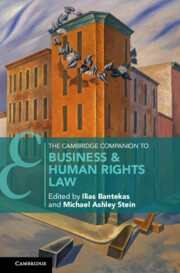Book contents
- The Cambridge Companion to Business & Human Rights Law
- Cambridge Companions to Law
- The Cambridge Companion to Business & Human Rights Law
- Copyright page
- Contents
- Figures and Tables
- Contributors
- Preface
- Cases
- Abbreviations
- 1 Business and Human Rights
- 2 Reconciling International Human Rights with International Trade
- 3 Neoliberalism, State-Capitalism and European Ordo-Liberalism
- 4 Corporate Governance and Corporate Social Responsibility
- 5 The Role of Business in International Development and the Attainment of the Sustainable Development Goals
- 6 The Business Case for Human Rights
- 7 The UN Guiding Principles on Business and Human Rights and Its Predecessors
- 8 The Regulatory Framework of Multinational Enterprises
- 9 The UN Global Compact and the OECD Guidelines for Multinational Enterprises and Their Enforcement Mechanisms
- 10 Taxation and Business
- 11 Corporate Accountability for the Natural Environment and Climate Change
- 12 Corporate Accountability for Corruption and the Business Case for Transparency
- 13 Disability, Business and Human Rights
- 14 Gender, Business and Human Rights
- 15 The Business Sector and the Rights to Work and Just and Favourable Conditions of Work
- 16 Responsible Lending
- 17 Business and Human Rights Approaches to Intellectual Property
- 18 The Role of Human Rights in Investment Law and Arbitration
- 19 The Use of International Arbitration Tribunals for Business and Human Rights Disputes
- 20 Innovative Contractual Remedies with Indigenous Peoples
- 21 The Role of Ethics in Corporate Human Rights Impact Assessments
- 22 Addressing Human Rights Impacts in Sustainability Reporting
- 23 Leveraging the Consumer-Led Movement to Strengthen Sustainable Business
- 24 The Structural Complexity of Multinational Corporations and the Effect on Managing Human Rights Risks in the Supply Chain
- 25 Towards a UN Business and Human Rights Treaty
- Index
9 - The UN Global Compact and the OECD Guidelines for Multinational Enterprises and Their Enforcement Mechanisms
Published online by Cambridge University Press: 10 September 2021
- The Cambridge Companion to Business & Human Rights Law
- Cambridge Companions to Law
- The Cambridge Companion to Business & Human Rights Law
- Copyright page
- Contents
- Figures and Tables
- Contributors
- Preface
- Cases
- Abbreviations
- 1 Business and Human Rights
- 2 Reconciling International Human Rights with International Trade
- 3 Neoliberalism, State-Capitalism and European Ordo-Liberalism
- 4 Corporate Governance and Corporate Social Responsibility
- 5 The Role of Business in International Development and the Attainment of the Sustainable Development Goals
- 6 The Business Case for Human Rights
- 7 The UN Guiding Principles on Business and Human Rights and Its Predecessors
- 8 The Regulatory Framework of Multinational Enterprises
- 9 The UN Global Compact and the OECD Guidelines for Multinational Enterprises and Their Enforcement Mechanisms
- 10 Taxation and Business
- 11 Corporate Accountability for the Natural Environment and Climate Change
- 12 Corporate Accountability for Corruption and the Business Case for Transparency
- 13 Disability, Business and Human Rights
- 14 Gender, Business and Human Rights
- 15 The Business Sector and the Rights to Work and Just and Favourable Conditions of Work
- 16 Responsible Lending
- 17 Business and Human Rights Approaches to Intellectual Property
- 18 The Role of Human Rights in Investment Law and Arbitration
- 19 The Use of International Arbitration Tribunals for Business and Human Rights Disputes
- 20 Innovative Contractual Remedies with Indigenous Peoples
- 21 The Role of Ethics in Corporate Human Rights Impact Assessments
- 22 Addressing Human Rights Impacts in Sustainability Reporting
- 23 Leveraging the Consumer-Led Movement to Strengthen Sustainable Business
- 24 The Structural Complexity of Multinational Corporations and the Effect on Managing Human Rights Risks in the Supply Chain
- 25 Towards a UN Business and Human Rights Treaty
- Index
Summary
This chapter discusses the United Nations Global Compact (UNGC) and the OECD Guidelines for Multinational Enterprises as voluntary standards for business and human rights. Both standards have received significant scholarly attention. Although both initiatives differ with regard to some dimensions (e.g., in terms of their scope), they also share a number of similarities (e.g., their voluntary and principle-based nature and their lack of monitoring). It is therefore appropriate to discuss both initiatives and to also compare them with each other (whenever possible and feasible). The discussion in this chapter proceeds as follows. The next section discusses the theoretical background by emphasizing the rise of voluntary standards related to corporate sustainability and responsibility. The following two sections provide a more practical discussion. Section three and four take an in-depth look at the UNGC and the OECD Guidelines and discuss (a) the basic idea underlying both initiatives, (b) their link to the business and human rights agenda, and (c) their enforcement mechanisms. The discussion of both standards shows one important similarity: the lack of a robust system to implement and enforce the promoted principles.
- Type
- Chapter
- Information
- The Cambridge Companion to Business and Human Rights Law , pp. 195 - 214Publisher: Cambridge University PressPrint publication year: 2021



